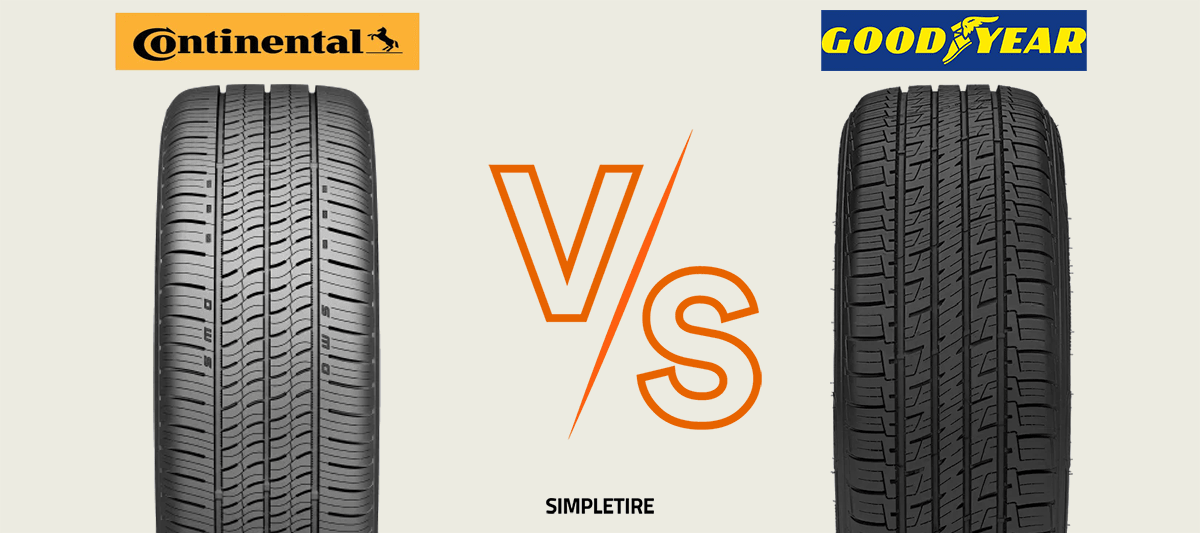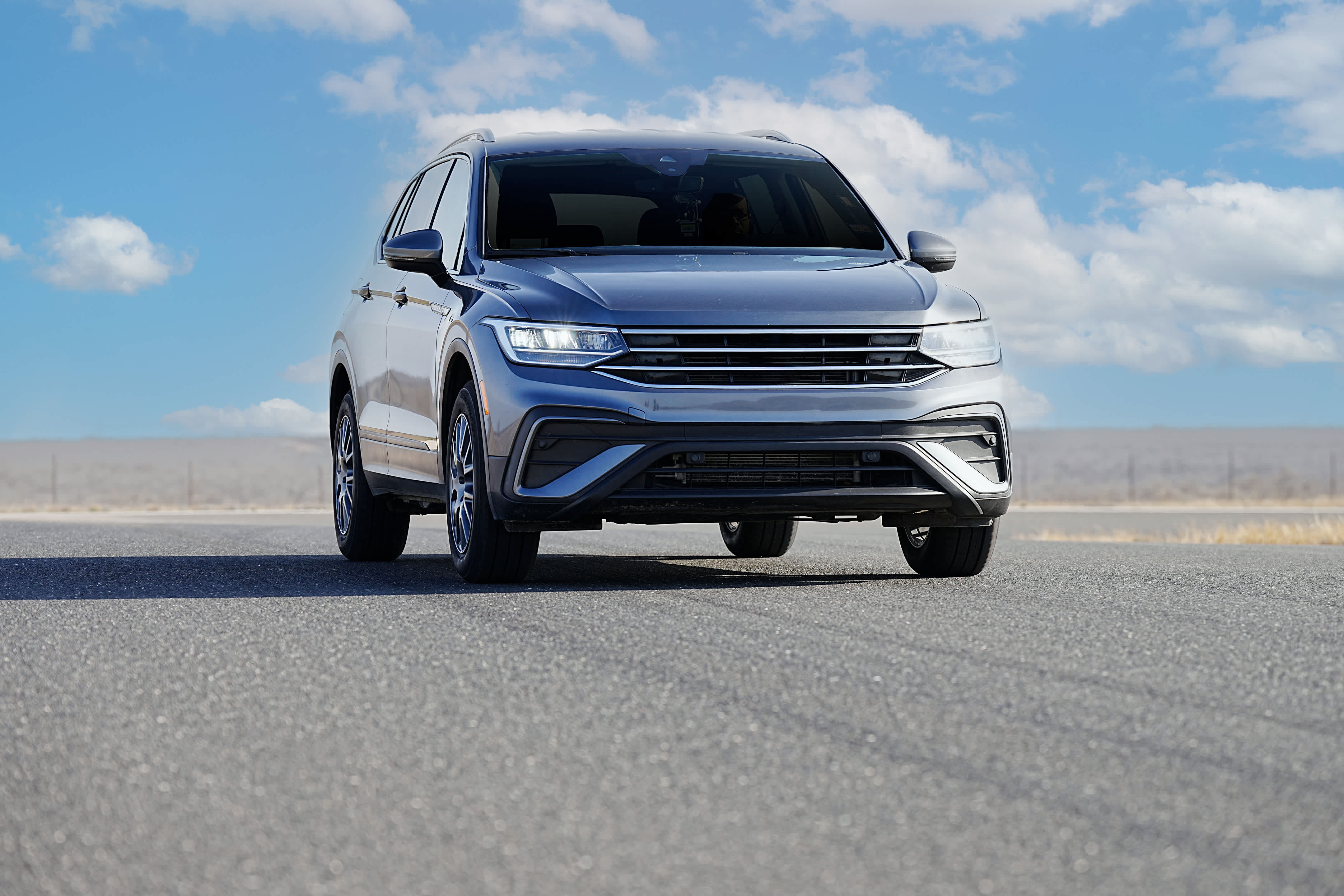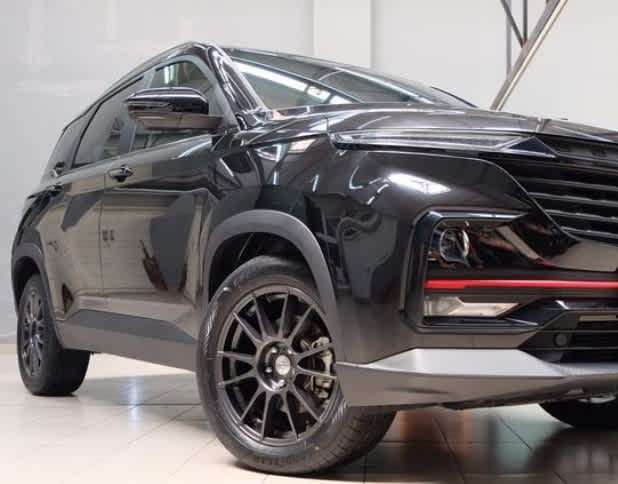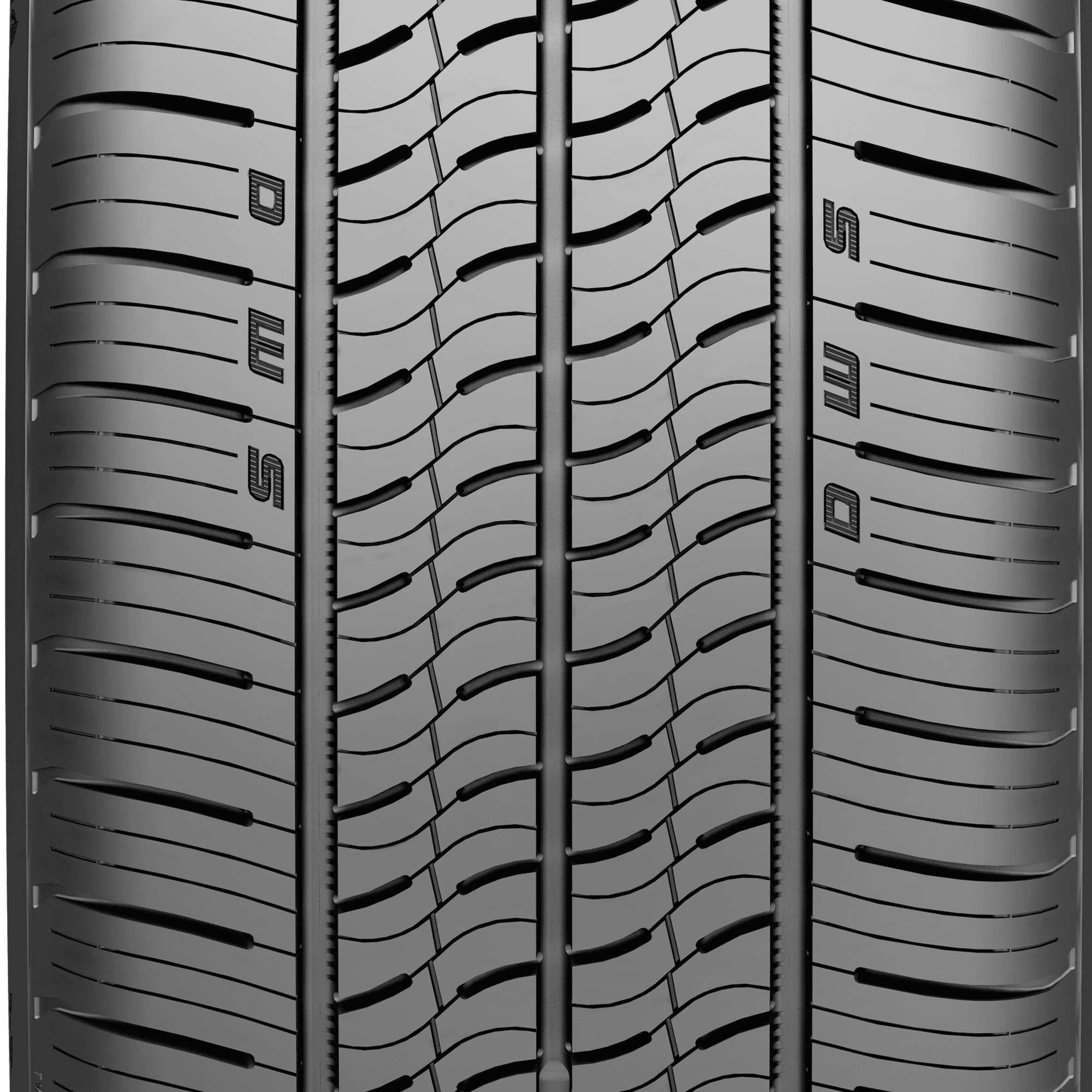Compare
Free shipping
Best price guarantee
SimpleCrew exclusive savings
0% financing options
Tire replacement coverage
24/7 roadside assistance
Easy returns

Year in and year out, all-season tires take up the huge bulk of sales of passenger tires, and for good reason. Drivers count on all-season tires for their dependable grip year-round along with smooth road manners, a forgiving ride, precise handling and cornering, low noise, and good wear properties with generous limited manufacturer’s tread life coverage from the factory.
These versatile jack-of-all-trades tires make up 84 percent of passenger tire sales, but then there are their close relatives, Grand Touring tires. Grand Touring tires are designed to meet most of the same performance expectations and design points as all-season tires but with more of a premium on low noise and refined ride quality. That’s why Grand Touring tires are the manufacturer’s choice as OEM for many luxury vehicles, and premium Grand Touring tires are designed hand-in-hand with automakers around the weight, power, torque, center of gravity, and overall driving dynamics of those vehicles.
Today we’re going to do a head-to-head comparison of two premium Grand Touring tires, the TrueContact Tour 54 from Continental and the Assurance MaxLife from Goodyear. These are both flagship tires from premium brands, and both are packed with the kind of innovations, top-quality features, and performance that are designed for the needs and expectations of drivers of premium vehicles.
In the course of this product comparison, you’ll see us make reference to the SimpleScore rankings for each tire. If you haven’t become acquainted with SimpleScore yet, that’s the rating method that the SimpleTire team devised to give you a quick, easy idea of a tire’s strengths and weaknesses. We take into account the tire’s technical details, specs, manufacturer information, customer reviews, and other data points, then boil down that information into a 1-10 numerical score for the categories of traction, handling, and longevity as well as an overall average SimpleScore for each tire. For the Continental TrueContact Tour 54 and Goodyear Assurance MaxLife, the SimpleScore numbers look like this:
Goodyear Assurance MaxLife:
- Traction: 9.2
- Handling: 9.1
- Longevity: 9.6
- Overall average SimpleScore: 9.3
Continental TrueContact Tour 54:
- Traction: 9.4
- Handling: 9.1
- Longevity: 9.9
- Overall average SimpleScore: 9.4
As handy as SimpleScore is, it doesn’t really give you a lot in the way of details of what a tire can offer, things like a technical overview of features or what makes a tire a superior value and a great performer. Let’s go in and get a closer look with this comparison review of the Continental TrueContact Tour 54 and Goodyear Assurance MaxLife:
Continental TrueContact Tour 54 tires

With the Continental TrueContact Tour 54, Continental started out with the proven success of the PureContact LS and TrueContact Tour; they built on some of the best design details of those two tires, then updating and developing them for the latest generation of sedans, coupes, minivans and crossovers. The TrueContact Tour 54 is designed around Continental’s EcoPlus technology package, which combines an advanced tread formulation, tread design, and internal construction that helps with substantial fuel savings over the life of the tire thanks to reduced rolling resistance and friction.
The TrueContact Tour 54 features three wide circumferential grooves that work as a system with angled grooves, lateral grooves, and a dense network of sipes to deliver year-round grip and fight hydroplaning by routing water through and behind the tire’s contact patch on wet roads. For handling and cornering that are crisp and precise, the shoulder blocks of the TrueContact Tour 54 are reinforced for enhanced rigidity across the tread face, resisting tread squirm and deformation during fast maneuvers. The Continental is quiet on the highway, with the tread pitch of the Continental randomized and computer-tuned to negate certain frequencies and harmonics and ensure low road noise.
One feature we’ve always liked with Continental tires is their wear indicators; the TrueContact 54 has its indicators molded into the tread, with the letters D, W, and S. When all three letters are visible, the tread depth is sufficient for dependable grip in dry, wet, or snowy conditions. When the S indicator wears down, traction should be good for dry or wet pavement, and when the W is no longer visible, the tire’s traction is only safe for driving on dry roads.
The internal construction of the Continental is beefed up a bit to handle the added curb weight of electric vehicles and hybrids, and its rolling resistance is designed so a driver can get the most out of their EV’s range and battery life. Tests show the results of the upgrades: up to 18% better tread life, 6% better wet-road braking, and 5% better dry-road handling as compared to the previous TrueContact Tour. You might have noticed the TrueContact Tour 54’s excellent longevity SimpleScore; that can be chalked up in part to the Continental’s warranty: the TrueContact Tour 54 is covered from the factory by an 80,000 mile limited manufacturer’s tread life warranty. SimpleTire’s price on the Continental TrueContact Tour 54 starts at $131.99 per tire.
Goodyear Assurance MaxLife tires

As you’d probably guess from the model name, Goodyear designed the Assurance MaxLife to be the tire with the longest mileage warranty in the Goodyear lineup. With its comprehensive TredLife package, the Assurance MaxLife is designed to live up to that expectation with a best-in-class 85,000 mile manufacturer’s treadwear warranty.
Road manners for the Assurance MaxLife are pretty flawless, with a solid center rib that’s designed for quick and light steering response as well as stable straight-line tracking. A system of notched intermediate ribs, and semi-closed shoulders round out the package for handling and driver feedback. While most tires have wear bars molded into the tread base to give a driver an early heads-up when the tire has reached minimum tread depth, the Assurance Max Life’s wear gauges are designed to let a driver easily assess tread depth through the entire life of the tire. Like the Continental, the Goodyear Assurance MaxLife is also designed to save fuel over the life of the tire with reduced rolling resistance.
The wet weather grip is confident and consistent, thanks to a set of circumferential and angled grooves and a dense network of sipes for a real edge in wintry weather. Ride quality with the Assurance MaxLife is refined and accommodating, with the tread design of the Assurance MaxLife computer tuned to help keep road noise low. SimpleTire’s price on the Goodyear Assurance MaxLife starts at $140.99 per tire.
Continental TrueContact Tour 54 vs Goodyear Assurance MaxLife tires on traction
How do the Continental and the Goodyear look against each other when it comes to traction? With the Goodyear’s SimpleScore of 9.1 vs 9.4 for the Continental, this one ended up pretty close. Neither the Continental TrueContact Tour 54 nor the Goodyear Assurance MaxLife has the Three Peak Mountain Snowflake rating for severe winter service, so neither one is going to be a great choice for heavy snow. Traction is more than just winter performance, though, and the Continental is designed with a comprehensive system of sipes and grooves for dependable grip and braking in wet or dry weather. Its sipe network and block edge design help provide confident performance in wet weather, and its tread compound is also optimized to improve grip on wet or dry roads. While the Goodyear is certainly capable when it comes to traction, our decision is:
ADVANTAGE: Continental TrueContact Tour 54
Continental TrueContact Tour 54 vs Goodyear Assurance MaxLife tires on handling

With SimpleScores of 9.1 for the Goodyear and 9.1 for the Continental, this one is a locked-in dead heat Neither tire exhibits many vices when it comes to handling and cornering ability, with little evidence of understeer and good, accurate control. The sane tread features that give the Goodyear and the Continental both such a high SimpleScore ranking for traction also help deliver handling and cornering that are dead-on. The handling properties of the two tires might not quite be what you’d expect from a performance tire, but both tires are more than capable performers when you’re on an interstate cloverleaf or tossing the car around on a twisty mountain road. Our decision is:
ADVANTAGE: TIE
Continental TrueContact Tour 54 vs Goodyear Assurance MaxLife tires on longevity
In the longevity category, we have a little bit of a conundrum. Usually, it’s the limited manufacturer’s tread life coverage that tells the whole story for longevity and SimpleScore rankings. The Goodyear comes along with an 85,000 mile warranty, vs 80,000 miles of coverage for the Continental, yet the Continental outranks the Goodyear with a near-perfect SimpleScore of 9.9 vs 9.6 for the Goodyear. In an instance like this, we’ll generally defer to the customer reviews; the customer is never wrong, after all, and our decision is:
ADVANTAGE: Continental TrueContact Tour 54
When to use each
The question here is, what do you really expect out of a set of Grand Touring tires? If you have to deal with heavy winter conditions and several inches of snow that stay on the roads for days or weeks at a time, neither the Continental nor the Goodyear might be right for you. If you expect the kind of white-knuckle performance and handling you’d get with an ultra-high-performance tire, these tires might both fall a little short of your expectations. If you’re on a budget and don’t want to spend a lot on a set of tires for an older vehicle, the Continental and the Goodyear are both a little on the pricey side (they’re premium tires, after all). But if you want a set of Grand Touring tires that will offer phenomenal tread life (the kind of tread life that was inconceivable a generation ago), a quiet and supple ride, reliable traction in everything other than heavier snow, and handling that’s dead-on for your sedan, coupe, minivan or crossover, you can’t go wrong with either the Continental or the Goodyear.
Which one should you choose?

Now that we’ve got a pretty good idea of what these two tires are about, you can see that the Goodyear comes out on top when it comes to SimpleScores for traction and handling. That doesn’t necessarily mean that the Continental TrueContact 54 is inferior, though. Both tires perform admirably when it comes to ride quality, handling, low noise, driver feedback, and (of course) limited manufacturer’s tread life coverage. Then there’s the slight differential in price, with the Goodyear starting at around $140 per tire vs $131 for the Continental. We’d just break it down this way; if you can afford the Goodyear, then go with that tire. If you want to save a few dollars on an entire set of tires, then the Continental is the way to go. We’ll safely assert that you won’t be making a mistake either way.
Still not sure which tire to buy? Fortunately, SimpleTire is here to help as our helpful agents are more than happy to assist you in selecting the right tire for your ride and budget.
Ready to find the perfect tires?
Search By